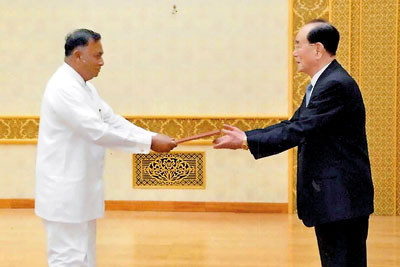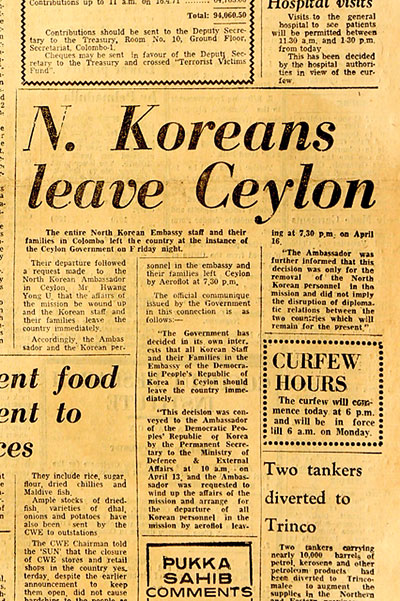News
Lanka gets tougher with NK; relations have been rocky since the 1970s
Diplomatic relations between Sri Lanka and North Korea (NK) have been troubled from its inception, and also vacillating, depending on the Govt in power here. However, the past two years has seen Sri Lanka take a tougher stance against NK, condemning both its nuclear programme as well as its human rights record.

Sri Lanka’s Ambassador to China Dr. Karunasena Kodituwakku presenting his credentials to the President of Presidium of the Supreme People’s Assembly of North Korea Kin Young Nam in August last year. Sri Lanka’s Ambassador in Beijing is concurrently accredited to Pyongyang.
While the issue of a press release in late July, condemning NK for launching an Inter-Continental Ballistic Missile (ICMB) drew controversy, after President Maithripala Sirisena took issue at a Cabinet meeting saying, as Head of State and Head of Govt he should be informed when Sri Lanka issues a statement against another country, it brought to the fore the inconsistency in Sri Lanka’s policy towards NK.
The contentious issue, of late, between the two countries has been NK’s continued testing of nuclear weapons, despite a UN resolution calling for a halt to all such testing.
Ministry of Foreign Affairs (MFA) Spokesperson Mahishini Colonne said that, as a member State of the United Nations (UN), Sri Lanka honours the Resolutions adopted by the UN Security Council on NK, in relation to the conduct of nuclear tests and ICBM tests.
The MFA has issued five statements pertaining to the issue, with the first in 2006, followed by one in 2013, two in 2016 and the latest in July this year. While the statements issued in 2006, 2013 and one in 2016 were limited to expressing concern regarding the testing of nuclear weapons, there has been a hardening of the Govt‘s stance on the matter since last year.
In the statement issued in September 2016 and in July this year, the Govt condemned NK’s actions, with the latest one calling on the “international community to unite in words and deeds to seek solutions to this grave situation, which is an ever increasing threat to international peace and security.”
The inconsistent policy towards NK too, is reflected in the manner in which Sri Lanka votes on the UN General Assembly (UNGA) resolution, “Situation of Human Rights in the DPRK”, which comes up annually at the UNGA sessions in September.
In 2007, Sri Lanka voted in favour of the Resolution, abstained in 2008 and 2009, and then voted against the Resolution in 2014. By 2015/2016, Sri Lanka once again voted in favour of the Resolution condemning the NK’s human rights record.
Sri Lanka’s decision to vote against the Resolution against NK in 2014, came at a time when Sri Lanka was itself facing censure by the UN over its human rights record.
Sri Lanka’s representative to the UN at the time had explained the decision to vote against the draft text on NK, stating “name and shame” Resolutions were unproductive and that its reference to encouraging the Security Council’s referral of the issue to the International Criminal Court was “unacceptable”.
The troubled relations between the two countries began in July 1970, when diplomatic relations were established and NK opened its embassy in Colombo. However, in the wake of the 1971 Janata Vimukthi Peramuna (JVP) insurrection, the Govt ordered the Embassy closed and expelled its entire staff.
“The Govt has decided in its own interest that all Korean staff and their families in the Embassy of the Democratic People‘s Republic of Korea in Ceylon should leave immediately,” the United Front (UF) Govt of the day led by Mrs.Sirimavo Bandaranaike said in a statement issued on April 17, 1971. The country was in the throes of an insurrection by the JVP at that time and there was suspicion that the NK had assisted the rebels, which led to their expulsion from the country.

Headlines in 1971: Sirimavo Bandaranaike's UF Govt. decides to send back Korean staff and family in the Embassy of the Democratic People‘s Republic of Korea following the JVP uprising
Prominent historian Prof K.M. de Silva, writing on “Linguistic Nationalism and A Socialist Experiment” in his book “The History of Sri Lanka”, says that, with the election of the UF Govt in 1970, which comprised the SLFP, the LSSP and the Communist Party (Moscow Wing), there was a new emphasis on the island’s foreign policy with a “distinct tilt to the left” and due to this, “In rapid succession, NK and the German Democratic Republic (then East Germany) were given diplomatic recognition.”
The NK Embassy opened in Colombo months earlier, on July 15, 1970. This was just two months after the UF Govt took power winning the general election held in May. But in less than a year, relations turned sour with the NK Embassy shut down and the staff ordered to leave the country.
Nevertheless, the expulsion did not mean the end of diplomatic relations between the two countries. As the Ministry of Defence and External Affairs, which issued the official government communique announcing the expulsion in 1971, said, “The decision was only for the removal of the NK personnel within the Mission, and did not imply the disruption of diplomatic relations between the two countries, which will remain for the present.
While the Govt of the day remained tight lipped about the actual evidence in its possession, to prove NK had assisted the JVP uprising, the decision was based more on strong suspicions about such a link.
M.D.D.Peiris who served as Secretary to Mrs. Bandaranaike between 1970-77, said the decision to close down the Embassy was likely because of the “pervasive suspicion” that NK had helped the insurgents.
“Mrs. Bandaranaike’s Govt in 1971 was left-of-center, with the CP (Moscow Wing) and LSSP in the coalition, and for her to decide to close down an Embassy of a socialist country, there had to be more than mere suspicion. But it is also possible that, in the aftermath of the shock of the insurgency, it was a precautionary measure,” Mr Peiris said.
Retired Senor Superintendent of Police (SSP) Upali Seneviratne who was attached to the Investigation Branch of the Criminal Investigation Department (CID) in 1971, and was among the team of officers who questioned JVP leader Rohana Wijeweera, says that, a “foreign connection” to the insurgents did not transpire during the investigation.
“There were a whole lot of rumors flying around about foreign involvement in the insurgency but, nothing of that sort transpired during the investigation which concluded swiftly, as we had the hierarchy of the JVP in custody shortly after they launched the attacks,” Mr Seveviratne said.
The suspicions of a possible NK link was based on the propaganda activities their embassy here had engaged in.
The NK Embassy in Colombo had, through the Ceylon-NK Friendship Societies set up across the country, engaged in distributing literature on guerrilla warfare and run full page articles in local newspapers, propagating the thoughts of the founder of NK, Kim-Il-Sung, which the Govt found provocative.
“The NK Embassy had, through Ceylon-NK Friendship Societies islandwide, distributed large quantities of revolutionary literature, much of which had been found in insurgent hideouts,” American authors Lloyd and Susanne Rodolph in their book “The Regional Imperative: The Administration of US Foreign Policy towards South Asian States under Presidents Johnson and Nixon,” stated.
While no “foreign connection” transpired during the investigations by the Criminal Justice Commission established by the Govt to prosecute the insurgent leaders, the book on US foreign policy towards South Asians States says a few of the insurgent leaders had received some training in NK and that, its nationals may also have brought large amounts of foreign currency into the country, which they changed on the black market and distributed to the JVP. However, evidence for this is equivocal, while there is no evidence of any arms aid to the JVP.
Then Prime Minister Mrs Bandaranaike, in a radio talk on April 25, 1971, hinted at NK involvement in the move to topple her Govt through armed insurrection, saying that, in the “case of one embassy (she did not name), certain activities carried out by them was giving strength and support to the terrorists who had been preparing themselves for their nefarious tasks”, and as they (the Embassy personnel) did not desist from such activities, she had to ask the ambassador to close down the embassy and leave the country.
While the closing of the Embassy did not spell the end of diplomatic relations between the two countries, Sri Lanka and NK have continued to maintain relations, though both countries do not maintain resident missions in each other’s countries. “The Sri Lanka Embassy in Beijing, China, is accredited to NK, while the NK Embassy in New Delhi, India, is accredited to Sri Lanka,” Ms Colonne of the MFA said.
A senior retired Foreign Service official, who wished to remain anonymous, said that, a well advised foreign policy towards NK can elevate Sri Lanka’s international stature, but overstating concerns like in the case of the recent statement condemning NK was detrimental and unnecessary. “Every country is concerned about nuclear weapons and we can express our concern as a party to the Treaty on the Non-Proliferation of Nuclear Weapons, but there is no need for gung ho,” he said.
He said that Sri Lanka has in the past, contributed to defuse tensions in the Korean peninsula, and one such example was, when, as the Chair of the Non Alignment Movement (NAM), the country called for an independent and peaceful reunification of Korea, by way of a Resolution adopted at the end of the 5th NAM Conference held in Colombo in 1976.

